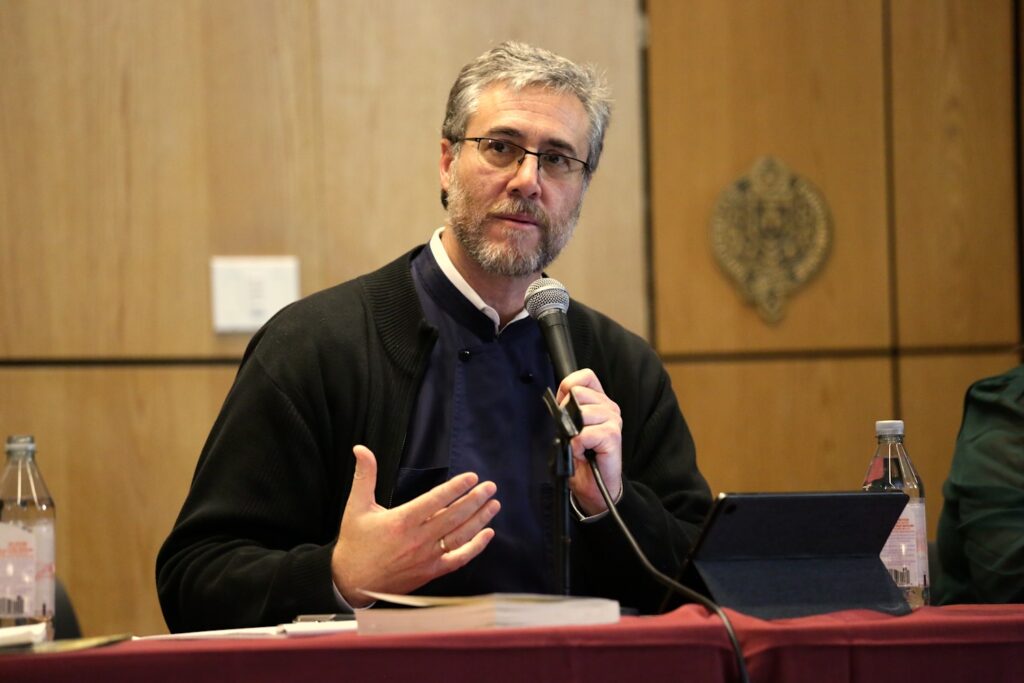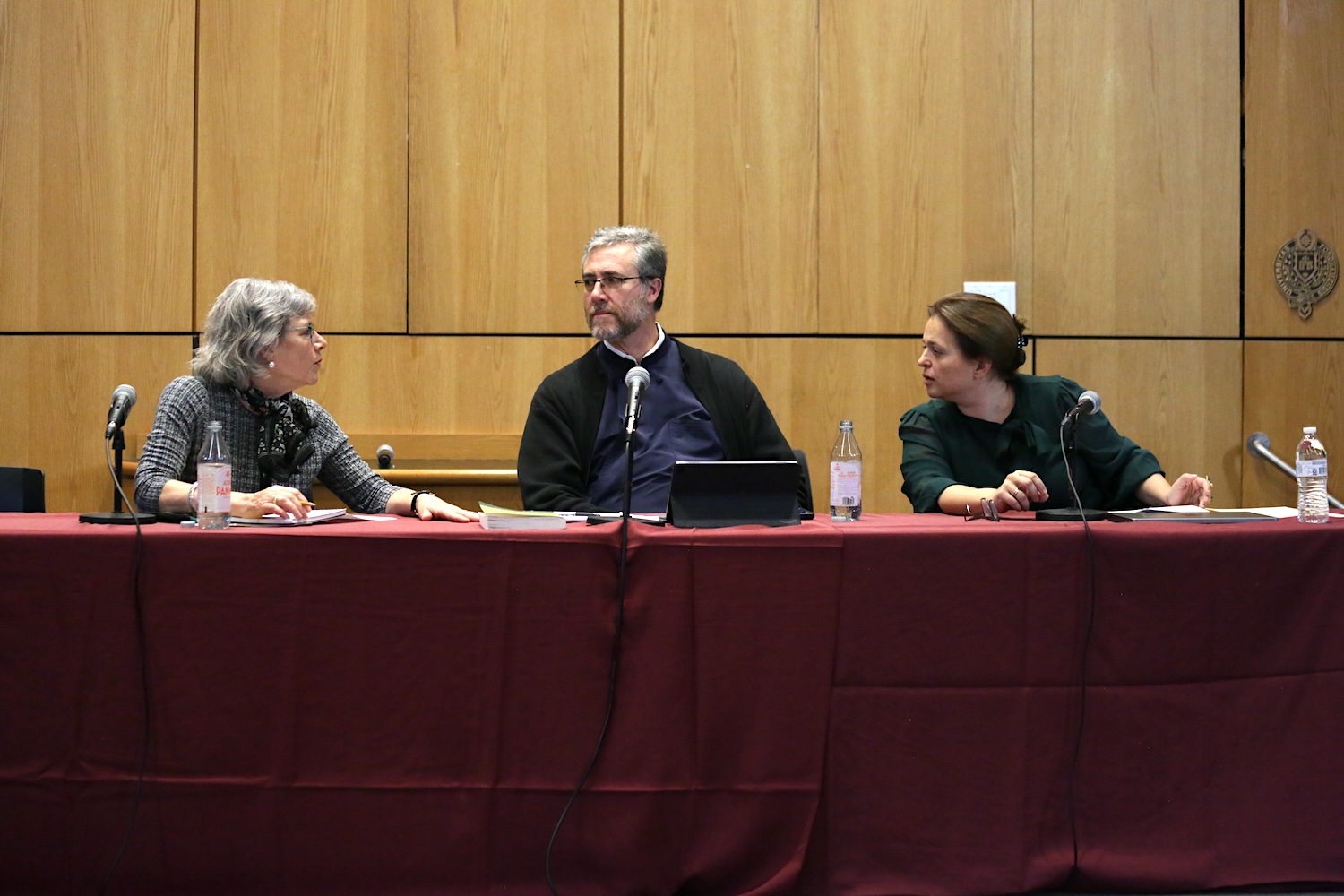Last month, the Orthodox Christian Studies Center, part of Fordham University, hosted a first-of-its-kind event on LGBTQ ministry in the Orthodox Church. The forum, entitled “Seeking Harmony and Compassion: Ministry among LGBTQ+ Orthodox Faithful,” featured two panels with academics, clergy members and lay people.
While the Orthodox hierarchy continues to publish encyclicals and pastoral letters reaffirming traditional definitions of marriage, and calling for celibacy among the unmarried, other voices are emerging around the Orthodox world. Clergy, academics, activists and the families and friends of LGBTQ parishioners are voicing concerns over the stories of isolation, loneliness and outright hostility that people of gender and sexual minorities often encounter.
Gender and sexuality are charged topics in the North American Orthodox context. Gatherings where Orthodox Christians have explored these concerns with compassion and nuance have largely been hosted in European countries, including Finland, Norway, the Netherlands and England. Nearly all these gatherings have been convened under the Chatham House Rule, meaning that participants could report what was said in the gathering, but not who said it.
In parallel to these academic developments, a new openness to dialogue on LGBTQ topics is emerging among Orthodox clergy and laity.
However, books are beginning to appear from these various meetings, such as “For I Am Wonderfully Made”: Texts on Eastern Orthodoxy and LGBT Inclusion and the more recent Orthodox Tradition and Human Sexuality. A third volume, Rethinking Gender in Orthodox Christianity, is expected soon.
In parallel to these academic developments, a new openness to dialogue on LGBTQ topics is emerging among Orthodox clergy and laity. In the Greek Orthodox Archdiocese of America, the Rev. Jerry Hall came out as a parent of a gay son during a 2013 address at the National Clergy Retreat. In response to his talk, other clergy reached out to share their own stories and seek advice.
Before long, a network began to emerge. Father Hall and his wife, Presbytera Helene Hall, organized archdiocesan events in 2016 and 2018. Last year, Elena Paraskevas-Thadani and Orlando Economos, lay parishioners of the archdiocese, co-authored a white paper entitled LGBTQ Christians and the Orthodox Church: A Review of the Church’s Stance on Homosexuality and LGBTQ People. These events within the Greek Archdiocese helped lay the groundwork for the Fordham event.
During the first panel on LGBTQ people and the Orthodox tradition, an academic historian, a religious ethicist and a liturgist discussed the ways in which tradition informs Orthodox theological reflection. Noting the contested nature of tradition, the participants carefully distinguished a living gospel response to new conditions and questions from an accumulation of past writings and practices.
Father Hamalis affirmed that same-sex couples are better off in the Orthodox Church, living a life that allows them to grow closer to Christ.
For example, most panel attendees were aware that marriage began as a pre-Christian institution, recognized early on by the church. However, many of those gathered were surprised to learn that the Orthodox Church recognized marriage as a sacrament relatively late, somewhere between the 10th and 12th centuries. While Christians recognized marriages before this, these arrangements were accepted as the dictates of Roman law and local customs.
Nina Glibetić, a liturgist at the University of Notre Dame, noted that what we today consider the common Orthodox marriage rite was a minority tradition among other locally observed rites and traditions in Orthodox communities. These now “traditional” services gained popularity through Venetian printers who reproduced and popularized their rubrics.
The Rev. Perry Hamalis, a religious ethicist at North Central College in Naperville, Ill., reviewed a set of propositions informed by a personalist theological anthropology, that all human persons are unique and unrepeatable. We all possess inherent dignity and are worthy of respect. We are created for relationships with God and one another. We all require intimacy, and we are all known through self-revelation.
However, humanity is also fallen, our desires often distorted. We are unable to save ourselves, but God’s actions through Christ subvert the order of the fallen world to invite us all into new life. By divine grace, we become wholly ourselves in a process of theosis, or deification. These claims are uncontroversial teachings within the Orthodox Church. Said Father Hamalis:
Given the tradition’s ethical methodology and attention to the particular reality of each person, and given the many ways that Christ himself disrupts the natural order, the religious establishment and the social status quo, I am not convinced that there is no form of LGBTQ sexual intimacy that does not promote holiness or progress in theosis. I would go so far as to say that our tradition is not so much heteronormative as it is hagio-normative. The holy is normative.
While certainly not a ringing endorsement of same-sex couples, Father Hamalis affirmed during the subsequent discussion that same-sex couples are better off in the Orthodox Church, living a life that allows them to grow closer to Christ.
The second panel discussion brought together parish priests and laity to discuss their experiences. Father Hall spoke of his son’s coming out experience and how this revelation opened him to LGBTQ ministry. Father Hall reflected on the ways that a “Don’t Ask, Don’t Tell” mentality inhibits personal openness, integrity and a sense of real belonging. And he criticized the expectation of celibacy for LGBTQ people as unreasonable.

Alongside Elizabeth Tzagournis, a lay Orthodox Christian, I shared my own experience of coming out and my relationship to Orthodoxy. While Elizabeth is a “cradle” Greek Orthodox Christian, I am a convert received through the Russian tradition of the Orthodox Church in America. (Tzagournis has previously written about the love and acceptance she felt within her family.)
My coming out began in the 1980s, and I was already an openly gay man when I was chrismated. Tzagournis shared the challenges of dating while maintaining focus on her faith. I offered a few comments on the needs of LGBTQ Orthodox faithful, from welcome and acceptance to the very practical fundamentals of a safe place for some transgender and nonbinary folks to use the restroom.
The Rev. Harry Pappas, a priest at the Archangels Greek Orthodox Church in Stamford, Conn., framed his reflections with two thoughts. First, we are all called to “repent, for the Kingdom of God has come near.” He described this repentance as an ongoing process of lifelong change in response to a continual re-centering of our lives towards Christ. He related this process of change to his kinship with Saint Peter. Called out of his comfort zone to minister to the Gentile and Roman centurion Cornelius, along with his family and associates, St. Peter modeled an embrace of God’s unexpected movement in the world.
The gathering was unique among American Orthodox forums as it sought to identify LGBTQ people in the ways they asked.
Neither seminary training, family background, nor his own marriage prepared Father Pappas for the situations he has encountered in 38 years of ministry. He related his encounter with an H.I.V./AIDS patient, hearing his confession and communing him. In another instance, a parishioner invited him to come and bless his home (an annual Orthodox tradition), only to reveal that he had been living with another man for 25 years. Rather than suggest the two men separate, Father Pappas blessed their home.
During broader discussions after each panel, several of those gathered shared their own stories: a gay Orthodox man active in the celibate LGBTQ Christian movement, a grandmother with a transgender grandchild who receives encouragement in her church community, a gay widower who enjoys an active parish community life with his adopted children, a former Orthodox priest who left parish ministry when he met his husband but continues an informal online ministry to LGBTQ Orthodox Christians.
The gathering at Fordham is a milestone in several ways. Aside from public talks given by the Rev. Thomas Hopko, the late Eastern Orthodox theologian, perhaps no other Orthodox events on sexual and gender minorities have gone to such lengths to humanize LGBTQ people. The gathering was unique among American Orthodox forums as it sought to identify LGBTQ people in the ways they asked. And while not all participants agreed on the interpretation of biblical passages or historical elements of the Orthodox tradition, everyone was focused on ways to include LGBTQ faithful in the life of the church.




